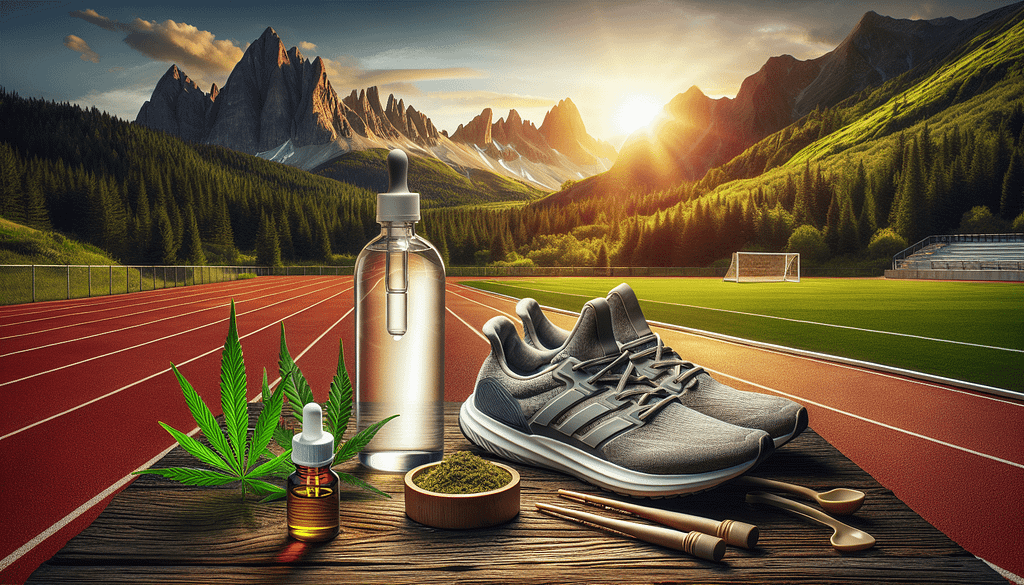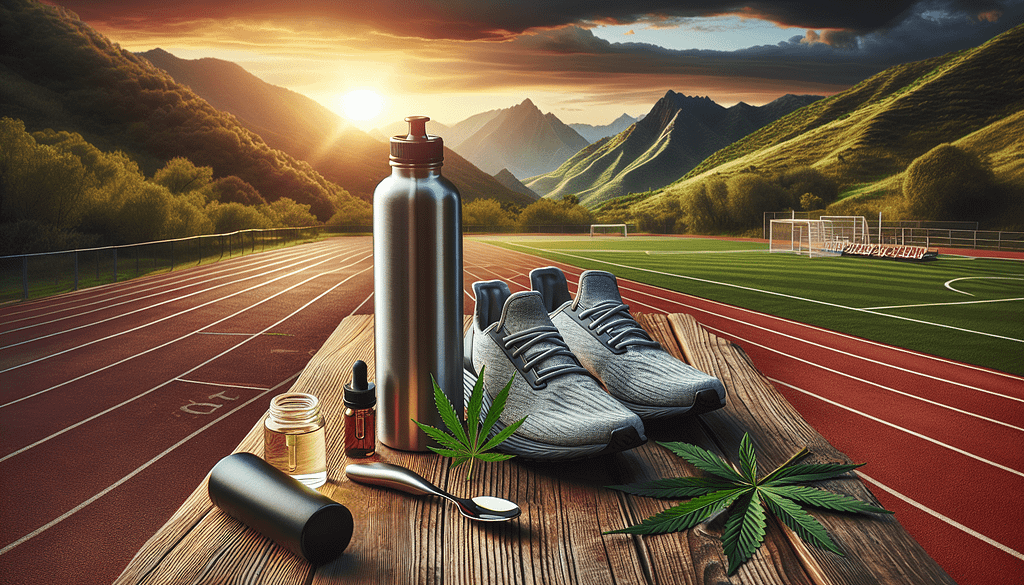As an Amazon Associate I earn from qualifying purchases.
Discover how CBD can enhance athletic recovery and performance. Explore benefits like reduced inflammation, pain relief, better sleep, and stress reduction. Read more!
CBD for Enhanced Athletic Recovery and Performance

Introduction
When it comes to athletic performance and recovery, every edge counts. Whether you’re a seasoned marathoner or a weekend warrior who loves a good gym session, optimizing your recovery process can lead to better performance, reduced injury risks, and an overall improved quality of life. Enter CBD — a natural compound that’s making waves in the fitness world. Known scientifically as cannabidiol, CBD is a non-psychoactive compound found in the cannabis plant that’s touted for its potential health benefits.
Intrigued? You’re not alone. Athletes and fitness enthusiasts alike are increasingly turning to this powerhouse compound to help elevate their performance and speed up recovery times. But what exactly is CBD, and how does it fit into your athletic regimen? Let’s dive in.
What is CBD?
CBD, or cannabidiol, is one of over 100 chemical compounds known as cannabinoids found in the Cannabis sativa plant. Unlike its more famous cousin, THC (tetrahydrocannabinol), CBD doesn’t produce a psychoactive effect. In other words, it won’t get you “high.”
What it does offer is a variety of potential medical benefits. Research has shown that CBD has anti-inflammatory, analgesic (pain-relieving), and anti-anxiety properties. These qualities make it an appealing option for treating issues like chronic pain, stress, and even sleep disorders — all of which can impact your athletic performance and recovery.
The Science Behind CBD and Athletics
Anti-inflammatory Properties
One of the most cited benefits of CBD is its powerful anti-inflammatory effects. When you exercise, your muscles develop tiny tears, causing inflammation and leading to soreness and stiffness. Traditional treatments like ice baths and anti-inflammatory drugs can help, but they often come with downsides, such as the risk of gastrointestinal problems from long-term NSAID use.
CBD, however, offers a natural alternative. It interacts with the endocannabinoid system (ECS) in your body, which plays a key role in regulating inflammation. By modulating this system, CBD can help reduce inflammation and, consequently, lower muscle soreness and stiffness.
Pain Relief
CBD’s analgesic properties are another significant advantage for athletes. Whether it’s the dull ache from an intense workout or acute pain from an injury, dealing with pain is part and parcel of being physically active.
CBD can help manage pain by interacting with your body’s vanilloid receptor, which is involved in the regulation of pain. Research suggests that CBD can be effective for both nociceptive pain (pain from physical damage) and neuropathic pain (pain from nerve damage). The best part? You avoid the risks associated with addictive painkillers.
Better Sleep and Recovery
Adequate sleep is crucial for athletic recovery and peak performance. While you sleep, your body goes through several processes that repair muscles, consolidate memory, and regulate hormones. If you’re not getting enough quality sleep, your performance and recovery can suffer.
CBD has shown promise in helping improve sleep quality. It can reduce anxiety and improve overall sleep patterns by interacting with your ECS, specifically affecting the serotonin receptors that influence mood and stress. Better sleep means quicker recovery and better performance.
Stress and Anxiety Reduction
Mental well-being is just as important as physical health when it comes to athletic performance. High levels of stress and anxiety can significantly hamper your performance and focus, making it more challenging to achieve your athletic goals.
CBD has been found to have anxiolytic (anxiety-reducing) properties. By acting on the serotonin and adenosine receptors in your brain, CBD can help lower feelings of anxiety and stress, making you more focused and relaxed.
Using CBD for Athletic Enhancement
Forms of CBD
When it comes to incorporating CBD into your athletic routine, you have several options:
- CBD Oils and Tinctures: These are taken sublingually (under the tongue) and offer quick absorption.
- CBD Capsules and Edibles: These provide a predetermined dosage and are easier to incorporate into your daily routine.
- Topical CBD: Creams, balms, and salves can be applied directly to sore muscles and joints for localized relief.
- CBD Beverages: Infused drinks like water, sports drinks, and even coffee provide another easy way to consume CBD.
Dosage and Timing
Finding the right dosage is crucial for maximizing the benefits of CBD. As with any supplement, individual needs can vary, and it may take some time to find the perfect dosage for you. Start with a low dose and gradually increase it until you achieve the desired effects.
Timing also matters. For general pain and inflammation, taking CBD post-workout can help speed up recovery. If you find that stress or anxiety affects your performance, using CBD before exercising may help you stay calm and focused.
Safety and Regulation
Before you add CBD to your fitness regimen, it’s essential to consider its safety and legality. CBD is generally considered safe, but it can interact with other medications you may be taking. Always consult your healthcare provider before starting a new supplement.
The legal landscape for CBD is also complex. While it is legal at the federal level in many countries, some regions have specific regulations governing its use. Make sure to check your local laws to ensure you are compliant.

Real-World Examples
Professional Athletes Using CBD
Many high-profile athletes are vocal about their use of CBD for performance and recovery. For instance, former NFL player Rob Gronkowski has become an advocate for CBD, crediting it for helping him recover from years of physical wear and tear. Mixed Martial Arts (MMA) fighters like Nate and Nick Diaz are also known to use and promote CBD, particularly for pain management and recovery.
Testimonials and Studies
Numerous scientific studies back the anecdotal evidence championed by these athletes. A study published in the European Journal of Pain found that topical CBD application has the potential to relieve arthritis pain and inflammation without notable side effects. Another study in the journal Sports Medicine highlighted CBD’s potential to aid in managing pain and improving sleep in athletes, emphasizing how these benefits could lead to enhanced performance.
Potential Downsides
Side Effects
Like any supplement, CBD is not without potential side effects. Some users report fatigue, diarrhea, and changes in appetite or weight. However, these side effects are generally mild and well-tolerated.
Drug Interactions
CBD can interact with other medications, especially those that come with a “grapefruit warning.” These are medications that are metabolized by the same enzyme that CBD inhibits. If you’re on medication, consult your healthcare provider to ensure that it’s safe to use CBD.
Legal and Sporting Regulations
Though generally legal, CBD’s relationship with sports organizations is more complex. Some athletic organizations have stringent regulations regarding the use of any cannabis-derived products. The World Anti-Doping Agency (WADA) has removed CBD from its list of banned substances, but THC is still prohibited. Always check with your sports organization to ensure you’re compliant with their rules.
How to Choose a Quality CBD Product
Purity
Look for products that are third-party tested for purity and potency. These tests ensure that the product contains the advertised amount of CBD and is free from contaminants like heavy metals, pesticides, and solvents.
Spectrum
Understanding the spectrum of CBD is crucial. Full-spectrum CBD contains all the cannabinoids found in the cannabis plant, including a small amount of THC. Broad-spectrum CBD includes most cannabinoids but removes the THC entirely. CBD isolate is the purest form and contains only CBD. Depending on your needs and regulatory concerns, you can choose the type that’s best for you.
Source
The quality of CBD products can vary significantly depending on where and how the hemp is grown. U.S.-grown hemp is subject to agricultural regulations and is generally of high quality. Go for brands that provide transparency about their sourcing and manufacturing processes.
Conclusion
CBD offers an exciting, natural way to enhance your athletic performance and speed up recovery. Its anti-inflammatory, analgesic, and anxiolytic properties make it a versatile tool in any athlete’s arsenal. While more research is needed to fully understand its long-term effects and optimal dosages, existing studies and real-world testimonials provide a compelling case for its benefits.
If you’re considering incorporating CBD into your athletic routine, start slow, consult a healthcare provider, and always opt for high-quality, third-party tested products.
If you found this article helpful, don’t forget to clap, leave a comment, and subscribe to my Medium newsletter for updates on the latest in fitness, health, and wellness. Your support helps us continue to provide valuable content!
Disclosure: This story incorporates AI assistance for content creation.
Amazon and the Amazon logo are trademarks of Amazon.com, Inc, or its affiliates.
